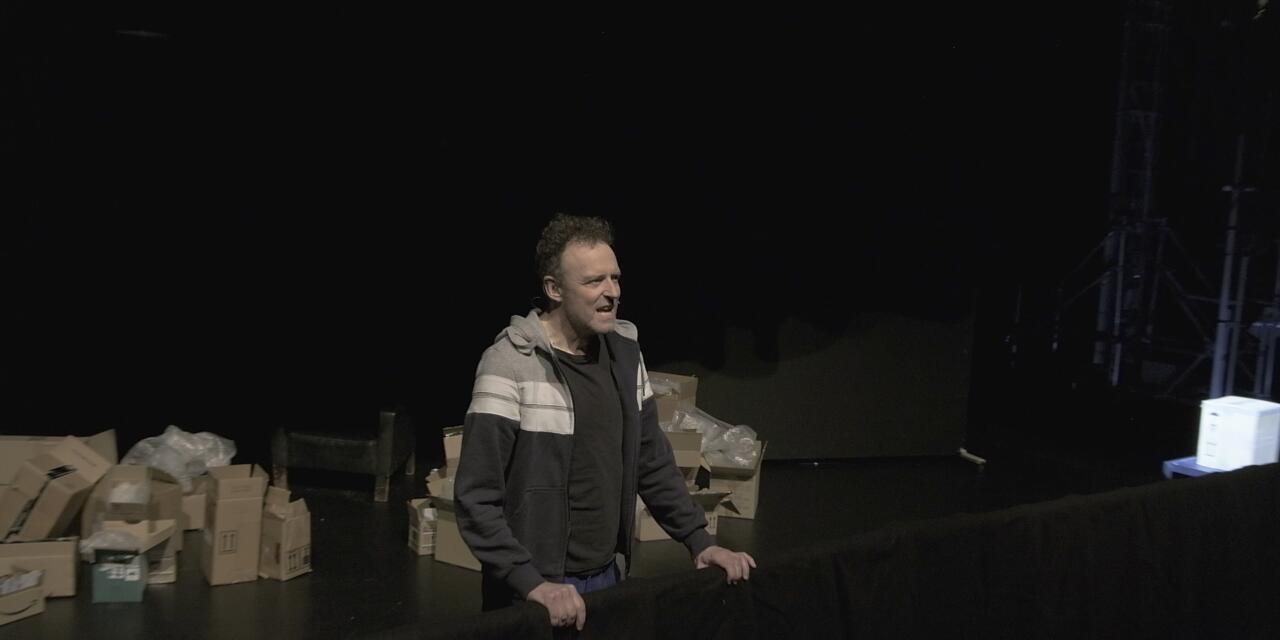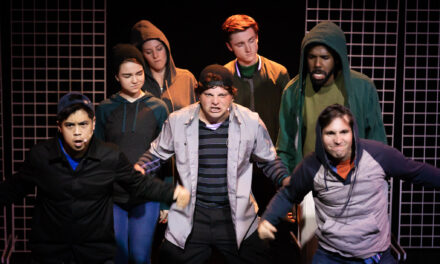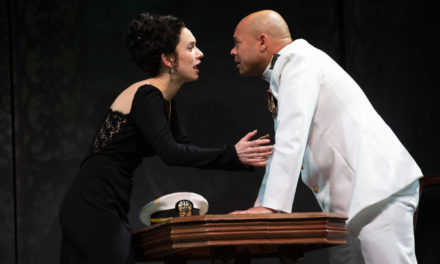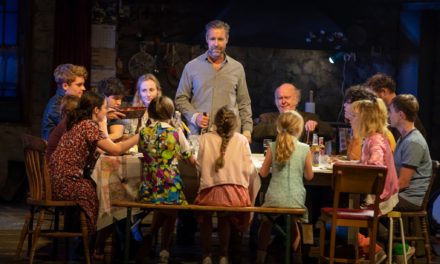UNBOX ME! Written by Simon Jones. Directed by Simon Jones. Dramaturgy by Sara Giddens. Bodies in Flight Theatre Company. The Wickham Theatre, Bristol, UK, 25 February 2023.
An ordinary working man in a high-vis vest stands stunned, stopped by a descending wave of Amazon boxes, its leading edge foaming with bubble wrap crashing onto his bleak, barren, and black shoreline; a desolate stage with only an armchair for comfort. Unbox Me! is a new play written by Simon Jones that opens by sending his everyman on a journey of epic proportions through an existential dystopian landscape that pays homage to the works of Samuel Beckett.
Unbox Me! offers us embodied poetics to accompany our hero across the aeons through worlds mythical and fabled in his herculean battles with Gods and Men, fighting to survive outnumbered and undone by the society that was meant to shelter him. Journeying through this no-man’s-land our gig-worker evokes ancient Greek theatre, awakening the cycle of death and rebirth, “Astride of a grave and a difficult birth […] the grave-digger puts on the forceps” (Beckett 1986: 84). Digging into humanities collective unconscious Unbox Me asks what humanity has become in the digital age.
In a boundary-breaking hybrid live digital production, the theatre company Bodies in Flight creates live theatre for our digitally mediated world. Non-literary theatre in which there are no linear narratives, no coherent characters or conversations, and all reality is an incomprehensible series of impressions, fleeting moments, and instants that may give us some brief flashes of where and who we are lost among the multiple spatial and temporal contexts enmeshed in our web of media online connections.
As the monologue gently unfolds our awareness progressively opens to its unspoken request. The same silent request that a Beckett or Robert Wilson production quietly asks of their audience; that this is a piece that needs to be put together by you, the spectator. An act of participation associated with the concept and act of immersion. If immersion into a world means active participation in the creation of that world, rather than the passive acceptance of the world with which we are presented? Unbox Me! is live theatre that demands our active participation in the creation of the world that we exist in. A play that embodies and makes visible our experience of the digitally mediated world. Unbox Me! not only recreates our immersive experience within the real and the digital world, it also creates a distance-provoking formalism and hyper-reflexivity on this process of creation, hence opening up new discursive possibilities on the geopolitical nature of our digitally mediated society.
Divided into five discreet, seemingly unrelated mini-acts the text of Unbox Me! flows seamlessly from a hyper-realistic mime poignantly forced into a one-sided mobile phone conversation with an answerphone, as we eavesdrop on our gig-worker speaking to an ever-unavailable daughter, time differences and double shifts as he barely touches the Pot Noodle made after another fruitless attempt at human contact; “no one answers.”
The script then flows into non-linear streams of consciousness, monologues that move from the sublime to the ridiculous, random, disjointed, fragmented, non-sensical ramblings erupting into incoherent verbal frenzies, violent, urgent, cryptic and elliptical, full of pauses, hesitations, repetitions, and black humor before plunging into the cool waters of lyrical poetry flowing heedless of punctuation, capitals, form or coherent meaning. These are formless taut streams of consciousness that throw up random but recognizable words and images from humanity’s collective unconscious, guiding the spectator’s mind’s eye into simultaneously making universal yet personalized random associations and meanings. That slowly emerges out of a formless dense fog of form and content to reveal fractured, indistinct visions emerging from the mind’s eye of contemporary society impossibly entwined with universal legends, myth, fable, ritual, dreams, memory, imagination, fact, and fiction all babbling and blurring any distinctions between the then and now. Universal images from within the minds-eye that slowly come into and out of being in various degrees of cohesion along a continuum forming the threads of society’s collective unconscious tying humanity together from its inception to its present manifestation.
The text veers from the first to the third person with no apparent pattern, refusing to illuminate any character psychology, inner motivation, or linear narrative. A random, nonsensical script that the action mirrors. As our everyman abandons the Pot Noodle “listlessly” to rummage and find amongst the encircling heap sent from Amazon an unopened box. A Pandora’s Box that rises in the dark above the small trolley on which he places it. A trolley hidden behind a black three-foot high barrier running along the front of the stage, our hero embarks on a struggle of Faustian proportions as he watches himself battle with the consequences of opening or not opening the box. Space, time, and causality cease to exist as with Stanley knife in hand he hovers in a no-man’s-land traveling across aeons and vast landscapes while never moving, on a torturous journey of existential self-examination.
That leads into an “ASIDE” in which he is “drawn around by the sensations” of an in-the-moment spontaneous dance, elegant gestures, movement, swaying, in which a sense of disembodiment emanates out towards the audience as his arms described other aeons, worlds, universes, galaxies. Embodying a sense of “nowness”, a concept that describes a sense of presence and timing in which our sense of temporality and experience of the present moment acknowledges both what is not-here-now and what is not-here-yet, constantly sustaining the intense sense of latent expectancy throughout the play. A ceaseless present that reminds us that time does move even if its motion means nothing and changes nothing.
This mesmerizing physical performance conjures up an invitation to the audience to engage and share collective visions; to connect to each other through mirroring each other. A sublime moment of improvisation that simultaneously felt handmade carved out and stitched together in a patchwork of impressions, human, obtainable and understandable, because of the occasional but regular physical hesitations, clumsiness, and uncertainty of our everyman.
A homemade sense of collective unconsciousness is reinforced by the next “ACTION” and a moment of bathos. As the protagonist moves closer to the hidden trolley with the box on top, he goes to take a selfie with the box, then it, and the trolley on which it sits, moves, apparently of its own accord towards stage right. The audience cannot see how the trolley moves because it is hidden and separated from the audience by crowd control barriers covered in black cloth. This moment of physical comedy both re-embodies and concretizes our gig-worker into a literal rather than abstract action, also making the sublime, human. There is a reversible rhythm to the piece as it moves from the sublime to the ridiculous and back to the sublime as the “3rd ACT” moves into lyrical poetry.
In which the spectator embarks on an interstellar voyage into the void, briefly implied when our gig worker previously allowed himself to be pulled and drawn by gravity into the orbit of a very bright spotlight standing six feet high down stage left. For what seems like an aeon he fearlessly stares silently into the heart of the Sun before turning away, shrugging off his existential angst to contemplate his own performance of instant gratification in his relationship with his selfie. Gently his body folds, slowly sinking to the ground, vanishing centre stage directly behind the black barrier. Hanging directly above him is a television screen attached to an overhead bar/proscenium arch and facing the audience. Suddenly awakening the screen reveals an image of our gig worker lying on his back swimming in zero gravity through an expanse of black space that merges with the vast dark and desolate empty space of the stage. His isolation is complete, as the screen forms a palimpsestous layering with the same vast expanse of black emptiness that forms the staging of the single isolated armchair, and which spoke of the barrenness and thirst for human companionship amongst the meaningless futility of those few very brief moments of identity determined by the contents of the boxes. There is no escape virtual or actual. As a camera attached to the screen feeds live film footage of our hidden gig worker isolated, lost, untethered, drifting alone in the vastness of space without even the comfort of stars or planets with which to guide and identify himself. Time stood still, or aeons passed as swimming on his back we all looked up for the answers to a life drained of meaning, understanding, life, love, substance, shape, or form.
A “CODA” then offers a glimpse of an answer, a brief moment of possible relief from this existential heartland as our gig worker opens Pandora’s Box. Simultaneously the bar with the camera and screen attached lowers with the “curtain” a metal shutter screen, as he is about to open the box. An image of the lid of the box now appears and completely fills the television screen, revealing the name and address of our gig-worker “Mr A. Everyman, Flat 13, Paradise Tower.” The image is quick “Cut to pre-recorded (color) sequence from POV [point of view] inside box looking up as the lid opens.” Almost immediately our hero becomes immersed in a huge wave of loud music and bright light flooding the stage, overwhelming and dissolving any defined or coherent spatial and temporal contexts, destroying any possibility of finding an identity he melts and disintegrates into a ritualistic dance of agony and ecstasy, “frantic, frenetic, furious and wild” in his high-vis vest “decked with flashing, multi-colored fairy-lights, and a coronet of fairy-lights” as the smoke and mirror-ball spin and swirl as a dervish done to exhaustion.
This is theatre for our contemporary times immersed and lost among the multiple spatial and temporal contexts in our web of media online connections. Unbox Me! offers a live immersive experience that temporarily anchors the spectator into the moving, fluid and ephemeral placelessness of digital reality. Offering the spectator an opportunity to reflexively experience a solipsistic, personalized and individualized experience that simultaneously taps into society’s collective unconscious to offer the spectator the option to “Make sense who may” (Beckett 2009: 160).
References
Beckett, Samuel. 1986. “The Complete Works of Samuel Beckett.” Faber and Faber, London.
Beckett, Samuel. 2009. “Krapp’s Last Tape and Other Shorter Plays.” Faber and Faber, London.
UNBOX ME! 2023. The Wickham Theatre, Bristol, UK. February 25.
Dr. Annette Balaam has recently completed her doctoral thesis Samuel Beckett and Virtual Reality at the University of Bristol, UK. She teaches Drama and Performance at the University of the West of England, UK. She has presented her work most recently in Bristol, London, Prague, Brussels, and Spain, and virtually in Berlin and Dublin. Her work on Samuel Beckett and virtual reality is in the process of publication in journals and books. Currently, she is drawing on just one aspect from this thesis to write on the extraordinary adaptability, interpretability, and intermediality of Beckett’s work. Her thesis Samuel Beckett and Virtual Reality can be found at www.academia.edu, the British Library and at the University of Bristol’s ‘Research’ website, along with her journal articles, conference papers, posters, and films.
This post was written by the author in their personal capacity.The opinions expressed in this article are the author’s own and do not reflect the view of The Theatre Times, their staff or collaborators.
This post was written by Annette Balaam.
The views expressed here belong to the author and do not necessarily reflect our views and opinions.


















